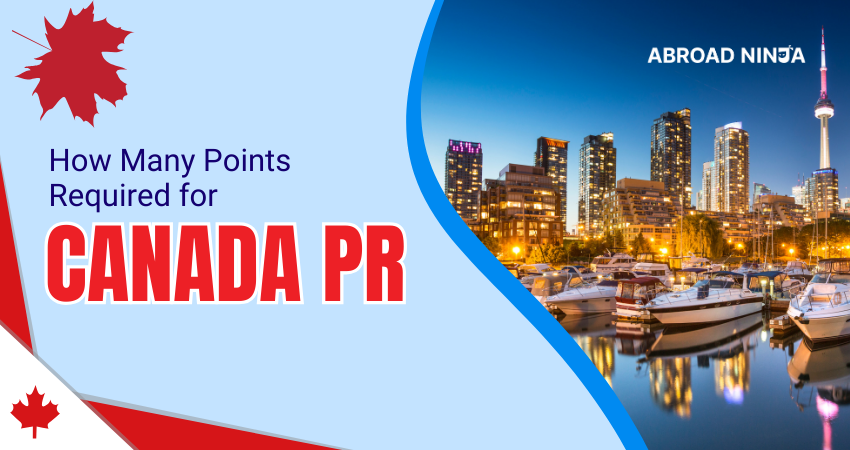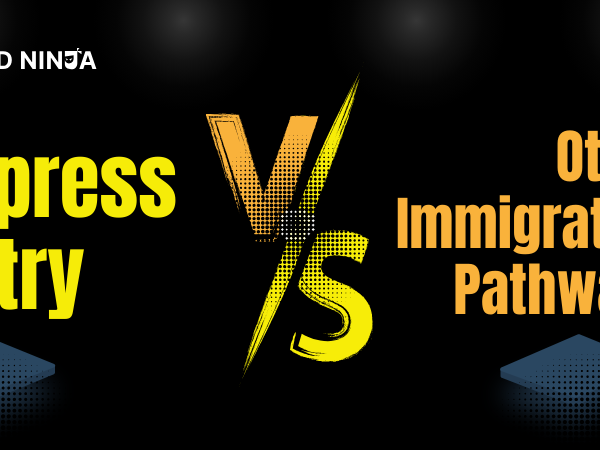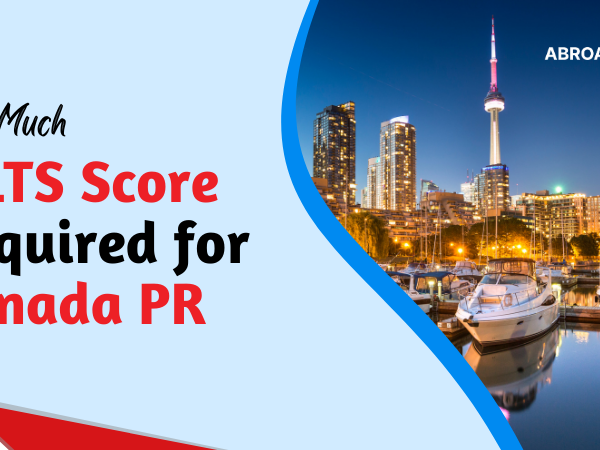Immigrants around the world are drawn to Canada. A common query is how many points are needed for a Canada PR? To answer this, you must understand the Comprehensive Ranking System (CRS). It assesses candidates based on age, education, work experience, language proficiency and adaptability.
It gives up to 1,200 points to applicants. The higher the score, the better your chances of getting PR in Canada. However, it is vital to note that the minimum score requirement does not guarantee selection. The Canadian Government conducts regular draws from the Express Entry pool to invite people with the highest CRS scores to apply for PR.
You can increase your CRS score through provincial nominations, a valid job offer in Canada or Canadian education credentials. Plus, you can enhance your language skills through tests such as IELTS or CELPIP. This can significantly boost your score in the points-based system.
To show the effect of high CRS scores on an applicant’s journey towards Canadian PR, here is Sarah’s story. Sarah was 29 years old with four years of work experience. She studied in Canada before returning. She achieved top marks in her IELTS exam and, without a job offer or provincial nomination, she accumulated 470 points. After a few months of submitting her profile to the Express Entry pool, Sarah was invited to apply for permanent residency.
Understanding Canada PR
Canada PR, or Permanent Residence, is a much-desired status for those looking to live in the Great White North. With numerous benefits, understanding the process can be intimidating. But don’t worry, we’ll help you through this life-changing journey by breaking down the details of Canada PR.
It’s important to know that Canada uses a points-based system when evaluating applicants for PR. The points are based on various factors such as age, education, work experience, language skills, and adaptability. The minimum required score changes depending on the immigration program you’re applying under.
For instance, the Federal Skilled Worker Program (FSWP) requires a minimum of 67 points out of 100 to qualify. Furthermore, certain provinces have their own nomination programs with unique requirements and point systems.
Note: Meeting the minimum score is necessary, but it doesn’t guarantee approval. The Comprehensive Ranking System (CRS) further evaluates applicants and ranks them in the Express Entry pool. Those with higher rankings have better chances of getting an invitation to apply for PR.
Pro Tip: To increase your chances of success, invest time and effort into improving your language proficiency and gaining extra work experience or educational qualifications that meet the country’s current needs.
Points System for Canada PR
To determine how many points are required for Canada PR, understand the Points System for Canada PR. Explore the eligibility criteria and factors considered for points allocation.
Eligibility Criteria
To get Canada PR, applicants must meet some conditions. These rules view many stuff such as age, education, work experience, language ability and adaptability. A points system decides hopefuls, with higher scores giving better chances of selection.
Eligibility Criteria:
- Age: Points depend on age at time of application. Younger people get more points than older ones.
- Education: More points for advanced degrees or diplomas.
- Work Experience: Points are given for skilled occupation experience. Longer experience gives more points.
- Language Proficiency: English or French proficiency judged by tests like IELTS or CELPIP. Higher score = more points.
- Adaptability Factors: Points for Canadian job offer, past study or work in Canada, or family living in Canada.
Unique Details: Unique factors may give extra points. For example, prior Canadian work experience in certain jobs can help.
True History: The criteria for Canada PR has changed to draw in skilled people who can help the country. The points system ensures those with great skills and attributes have priority.
Factors considered for points allocation
In order to get the most points, it’s important to learn about the various factors considered. Age, education, work experience, skill transferability, language proficiency, and adaptability factors all play a role.
For example, age between 20-29 years yields maximum points. Education also matters; higher levels of education get more points. Experience? That’s also essential; more years of experience = more points. Plus, special cases with a combo of education and work give additional human capital points.
Language proficiency in English or French can significantly boost CRS score. Adaptability points are awarded to those with study/work in Canada, a valid job offer, or a family member living in Canada. Lastly, other unique details such as sibling(s) living in Canada, Canadian education credentials, or French language proficiency will positively contribute to CRS score.
To maximize chances of getting PR, understand each factor’s significance and work to improve them. Strategize and enhance your profile based on these factors to increase your CRS score and boost chances of receiving an invitation. Don’t miss out! Start preparing now and make sure you meet criteria for a high CRS score. Embrace this chance to build a better life for yourself and family in a diverse and thriving country.
Also Read: Exams to Study in Australia: IELTS, TOEFL, PTE, GMAT, GRE, LSAT, etc, UG & PG Score Requirements
Minimum Points Required for Canada PR
To determine the minimum points required for Canada PR, explore the Express Entry system and Provincial Nominee Programs (PNPs). Discover how these two avenues provide solutions for achieving the necessary points threshold.
Express Entry System
Express Entry System – It’s the main pathway for skilled workers to get Permanent Residency in Canada. It’s a competitive system that evaluates candidates based on age, education, work experience and language proficiency.
The Express Entry System is distinctive because it works with an online platform. Candidates who are eligible can make a profile and enter the candidate pool. The higher the Comprehensive Ranking System (CRS) score, the greater the chance of getting an Invitation to Apply (ITA) for Permanent Residency from Immigration Refugee Citizenship Canada (IRCC).
Tip: Improve your CRS score! Get higher education, better language skills, and gain more work experience in Canada.
Provincial Nominee Programs (PNPs)
Provincial Nominee Programs (PNPs) are governmental initiatives designed to select immigrants that possess the aptitude and knowledge to help the local economy. These programs are essential to Canada’s immigration system, as they tackle the labour market needs of each province.
The point system for each province/territory varies. It is based on factors such as education, work history, language skills, age, and adaptability. Aspiring immigrants must research and comprehend the specific necessities of each PNP they’re interested in.
In the past, these programs were mainly used to draw in French-speaking skilled workers. However, as Canada’s immigration needs have altered, the aim of the PNPs switched to attract a broader range of talented workers with different backgrounds and capabilities.
By knowing the backstory and details of Provincial Nominee Programs (PNPs), aspiring immigrants can better understand Canada’s immigration system and raise their chances of obtaining permanent residence in the province or territory that best suits their abilities and objectives.
Strategies to Increase Points for Canada PR
To increase points for Canadian PR, explore strategies like improving language proficiency, obtaining Canadian education, and gaining work experience in Canada. These sub-sections provide solutions to enhance your chances of securing a higher score in the point-based immigration system.
Improving Language Proficiency
Sophie migrated from France to Canada, with basic English knowledge. She wanted to get a higher PR score, so enrolled in a local institute’s language classes. She was dedicated & worked hard. The effort paid off when she passed the IELTS exam with great marks. This increased her Canadian PR points.
Plus, Sophie joined language exchange programs. This gave her the chance to practice speaking and learn cultural nuances. This enabled successful communication in Canada.
Obtaining Canadian Education
Let’s examine the table below to better comprehend the necessity of gaining Canadian Education:
| University Name | Location | Ranking |
|---|---|---|
| University of Toronto | Toronto | 1 |
| University of British Columbia | Vancouver | 2 |
| McGill University | Montreal | 3 |
These esteemed universities in Canada not only offer top-notch education, but also enhance your point score for Canada PR.
Moreover, studying in Canada provides you with unique experiences and exposure. The diverse cultural environment promotes personal growth and increases your adaptability skills. Plus, networking with other international students and teachers can be advantageous in the future.
Due to the excellence of education along with encouraging immigration policies, numerous international students have been drawn to Canada. This has significantly contributed to the nation’s multicultural society and economic growth.
Also Read: Best Courses to Study in Canada For Indian Students
Gaining Work Experience in Canada
Gaining work experience in Canada is a must for higher points in Canada PR. Immigrants acquire skills and knowledge highly valued by the Canadian gov’t by working in the Canadian labor market. Many ways exist to get this experience, such as getting a job offer from a Canadian employer or applying for the Post-Graduation Work Permit after studies in Canada.
Working in Canada gives immigrants a taste of the Canadian work culture, industry standards, and professional networks. They can become more proficient in the language and gain new skills related to their profession. This experience boosts their employability and increases their CRS score when applying for PR.
Apart from work experience, immigrants can boost their CRS score by gaining unique details not covered already. Participating in volunteer activities, community service projects, or extra educational courses related to their field of expertise demonstrate commitment to contributing to Canada.
Jane’s story is a prime example of how work experience in Canada can lead to success with Canada PR. Jane immigrated with a Bachelor’s degree in Computer Science but faced difficulties due to lack of local experience. She volunteered at tech-related events and networked extensively. Her efforts paid off with a job from a Canadian company. She significantly improved her CRS score through this valuable experience and obtained PR.
Conclusion
Meeting the score threshold for Canada PR is a must. But it’s only one part of the application process.
Work experience, education, language proficiency and adaptability are also important. These can help you get PR. It’s essential to stay up to date with changes in immigration policies and regulations. Keep reviewing and refining your profile for the best chance at PR. Don’t miss out on this amazing opportunity! Improve your profile today, and stay informed about any updates. Your future is waiting!
Frequently Asked Questions
FAQs about the points required for Canada PR:
Q: What are the minimum points required for Canada PR?
A: The minimum points required for Canada PR vary depending on the immigration program you apply for. Currently, the Federal Skilled Worker Program requires a minimum of 67 points out of 100.
Q: How are the points calculated for Canada PR?
A: Points for Canada PR are calculated based on various factors such as age, education, work experience, language proficiency, adaptability, and arranged employment. Each factor has a certain maximum score assigned, and the cumulative score determines your eligibility.
Q: Can I apply for Canada PR without meeting the minimum points requirement?
A: No, you must meet the minimum points requirement to be eligible for Canada PR. However, if you do not meet the points requirement, you can consider improving your profile by gaining more work experience, enhancing language proficiency, or pursuing higher education, among other options.
Q: Do I need a job offer to get enough points for Canada PR?
A: No, a job offer is not mandatory to score enough points for Canada PR. While a valid job offer can give you additional points, you can still meet the minimum points requirement through other factors like education, language proficiency, and work experience.
Q: What happens if I have more points than the minimum requirement?
A: Having more points than the minimum requirement increases your chances of being selected for Canada PR. It also allows you to rank higher in the Express Entry pool where candidates with higher scores have better chances of receiving an Invitation to Apply (ITA) for permanent residence.
Q: Can I calculate my points for Canada PR on my own?
A: Yes, you can use the Comprehensive Ranking System (CRS) tool provided by Immigration, Refugees and Citizenship Canada (IRCC) to calculate your points for Canada PR. It will help you assess your eligibility and determine your CRS score accurately.




